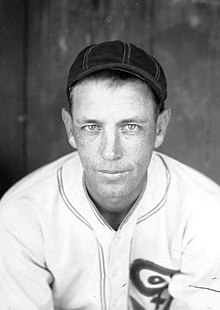Ted Lyons
| Ted Lyons | |||
|---|---|---|---|

Lyons in 1930 with the Chicago White Sox.
|
|||
|
Born: December 28, 1900 Lake Charles, Louisiana |
|||
|
Died: July 25, 1986 (aged 85) Sulphur, Louisiana |
|||
|
|||
| MLB debut | |||
| July 2, 1923, for the Chicago White Sox | |||
| Last MLB appearance | |||
| May 19, 1946, for the Chicago White Sox | |||
| MLB statistics | |||
| Win–loss record | 260–230 | ||
| Earned run average | 3.67 | ||
| Strikeouts | 1,073 | ||
| Managerial record | 185–245 | ||
| Winning % | .430 | ||
| Teams | |||
|
As player As manager |
|||
| Career highlights and awards | |||
|
|||
| Member of the National | |||
|
|
|||
| Inducted | 1955 | ||
| Vote | 86.5% (eighth ballot) | ||
As player
As manager
Theodore Amar Lyons (December 28, 1900 – July 25, 1986) was an American professional baseball starting pitcher, manager and coach in Major League Baseball (MLB). He played in 21 MLB seasons, all with the Chicago White Sox. He is the franchise leader in wins. Lyons won 20 or more games three times (in 1925, 1927, and 1930) and became a fan favorite in Chicago.
He was inducted into the Baseball Hall of Fame in 1955. He has the second highest career ERA of any Hall of Fame pitcher. He is also the only Hall of Fame pitcher who gave up more walks than he had strikeouts.
Lyons broke into the major leagues in 1923 after playing collegiate baseball at Baylor University. He joined the White Sox on a road trip and never pitched a day in the minors. He recorded his first 2 wins as a relief pitcher in a doubleheader on October 6, 1923, making him one of the first pitchers to perform the feat. He worked his way into the starting rotation the following year, when he posted a 12–11 record and 4.87 ERA.
Lyons pitched a no-hitter on August 21, 1926, which took just 1 hour and 45 minutes to complete (Ted Lyons August 21, 1926 No-hitter Box Score).
Lyons was at his crafty best in 1930, when he posted a 22–15 record and A.L.-leading totals of 29 complete games and 297⅔ innings for a team that finished 62–92. Prior to a 1931 arm injury, his pitches included a "sailer" (now known as a cut fastball), knuckleball, curveball, and changeup. After the 1931 injury, his pitches included a fastball, slow curve, knuckleball and an even slower curveball used as a changeup.
...
Wikipedia
